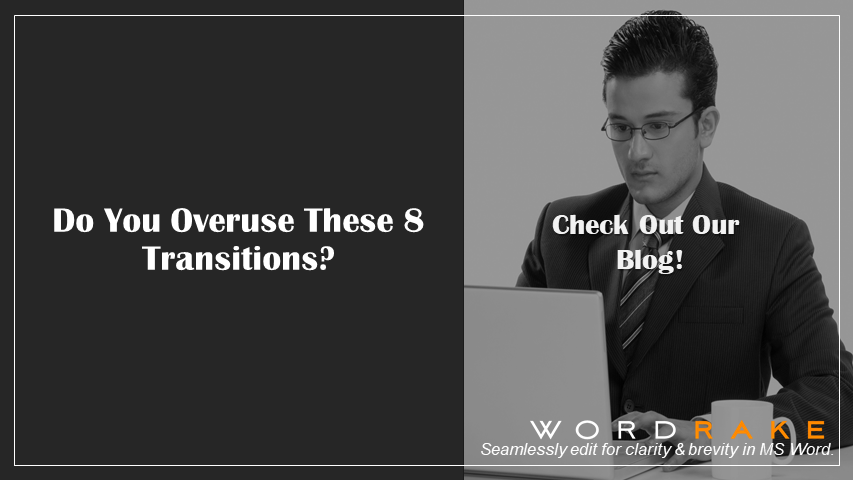In sales and marketing you’re advised not to talk past the point of the sale. That means when the buyer says yes, you stop trying to sell them. Continuing to talk may turn your yes into a no. This is also good advice for writing: Once you’ve made your point, stop.
Though much writing advice focuses on how to cut to the point, little advice discusses how to stop once you’ve reached it. Yet restraint will make your sentences powerful and your documents readable.
Finding the End Before the Period
By the time writers finish their thought in a sentence, readers often must get though extra words to reach the period. Adding more words after the thought is complete is ill-advised because the information is likely redundant. Try it. Give your last few memos a fresh read. You’ll find that expressions and prepositional phrases at the end of your sentences often repeat information rather than emphasize it.
Here are some expressions to watch for:
|
Expression |
Example |
Why can it be deleted? |
|
at issue |
The defendants knew about conflicts and the effect they had on the clients who invested in the stocks at issue. |
Using the before stocks already defines which stocks you're referring to. At issue adds unnecessary words that can confuse readers unfamiliar with the phrase. |
|
in this case |
The attorney told me it's likely that the judge took a $10,000 bribe in this case. |
Using the before attorney and judge gives enough context to make in this case unnecessary. When the context is so clearly defined, the reader won't imagine the judge taking a bribe in some other case. |
|
at all times |
Sponsorship of partisan programming is prohibited at all times. |
In English, the present tense already means always or in general. There's no need to specify at all times unless you're making a contrast with something that is prohibited only occasionally. |
|
at this time
|
The federal cases are moving quickly, and nothing is gained by permitting the plaintiff to proceed with this mere subset of that litigation at this time. |
The verb tenses (the present progressive with are moving quickly and the present tense with nothing is gained) give us the same information as at this time. |
|
at this point |
In 1934, Germany became the first government to place the wolf under protection, though the species was already extinct in Germany at this point. |
The past tense verb was and the word already show us the order of events, making at this point redundant. |
|
at that juncture |
When I worked at the agency, I wasn't even in the medication department, and the doctors there were handling these drugs every day, so I knew much less about them than they did at that point. |
The information is in the past tense, so the speaker need not specify at that point [in the past]. If the speaker needs to specify that he or she knew more about the drugs later, that change must be explained, even after saying at that point. |
|
as a result |
The boss achieved many successes, and her team became much more deferential to her as a result. |
Verbs like became and turned into already show there was a change, and the information in the sentence shows why. |
|
at the present time |
He will not be pursuing further action at the present time.
|
The verb tense includes the present aspect (pursuing), which tells us that the writer is talking about the present time. |
|
at present
|
The police chief announced that there have been no arrests at present.
|
In English, the present perfect (e.g., there have been no arrests) often shows that the action may change (i.e., there have been no arrests yet; there may be arrests in the future). We don't need at present to give us that same information. |
|
if you want |
You can visit us later if you want. |
If your sentence starts with an option (ex. you can…) then if you want is inherent information. Modal verbs like can and may already show that the person can choose not to do the action. |
|
not… at all |
The philosopher argued that babies begin life with no moral beliefs at all. |
When a sentence already has the negative (not at all, nothing at all), the expression at all is only for emphasis. |
|
none at all |
A few families at the emergency shelter brought some belongings, but many families arrived with none at all. |
Here, at all is used for emphasis after a negative word. It is often unnecessary to emphasize something that is an absolute, like empty or non-existent. |
|
if at all possible |
He will try to come to the meeting if at all possible.
|
The verb try shows the reader that the event might not happen. Deleting if at all possible can make your argument stronger and more direct. |
|
if possible |
Patients with MDR-TB should be isolated in negative-pressure rooms, if possible. |
The modal verb should already shows this is a suggestion (i.e., something possible). |
|
to the extent that something existed (at all) |
The political transition plans were also rudimentary, to the extent that they existed at all. |
The expression to the extent that something existed at all uses a lot of words to say that something barely existed. Strong word choice in the sentence can share this same information more concisely. In this example, rudimentary shows the plans were not developed well enough. |
|
something offered, presented, set forth, submitted, mentioned |
The purpose of this class notice is to give class members enough information to decide whether they should accept the benefits offered. |
These passive participles are often redundant at the end of a sentence. The defining articles, prior adjectives, verbs, and main nouns almost always give the information necessary. |
Cut the Cluttered Conclusions
The table above reveals just how many expressions and permutations can be deleted from your writing. Let WordRake do the legwork of cutting these expressions. Our team of linguists and grammar experts have spent the hours necessary to detail the changes the software should make. That way, you need only click and sit back as WordRake cleans up your writing. Sign up for your free trial today at https://www.wordrake.com/trial.
If you’d like to learn more, check out our eBook where WordRake founder and New York Times bestselling author Gary Kinder discusses these weak endings in 8 Secrets to Writing Clearly & Concisely.
About the Authors
Ivy B. Grey is the Chief Strategy & Growth Officer for WordRake. Before joining the team, she practiced bankruptcy law for ten years. In 2020, Ivy was recognized as an Influential Woman in Legal Tech by ILTA. She has also been recognized as a Fastcase 50 Honoree and included in the Women of Legal Tech list by the ABA Legal Technology Resource Center. Follow Ivy on Twitter @IvyBGrey or connect with her on LinkedIn.
Danielle Cosimo is a Language Usage Analyst for WordRake. Before joining the team, she was a translator and editor for non-native English speakers applying to degree programs in the United States and the UK. Danielle is formally trained in linguistics and has a certificate in computer programming. She is fluent in English, Portuguese, and Spanish. She applies her interdisciplinary knowledge to create WordRake’s editing algorithms.








